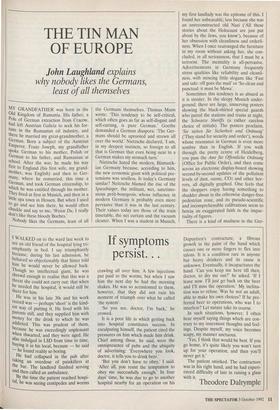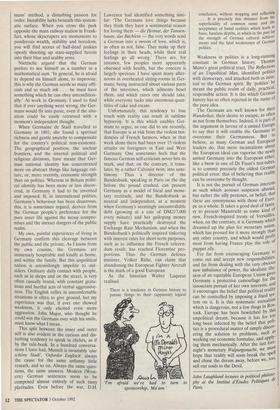THE TIN MAN OF EUROPE
John Laughland explains
why nobody likes the Germans, least of all themselves
MY GRANDFATHER was born in the Old Kingdom of Rumania. His father, a Pole of German extraction from Cracow, had left Austrian Galicia to seek his for- tune in the Rumanian oil industry, and there he married my great-grandmother, a German. Born a subject of the Austrian Emperor, Franz Joseph, my grandfather spoke German to his mother, Polish or German to his father, and Rumanian at school. After the war, he made his way first to England (his first wife, my grand- mother, was English) and then to Ger- many, where he remarried, this time a German, and took German citizenship, to which he was entitled through his mother. They lived at first in Munich, and then in a little spa town in Hessen. But when I used to go and see him there, he would often chuckle and say to me, `Weisst Du, I really don't like these bloody Boches.'
Nobody likes the Germans, least of all the Germans themselves. Thomas Mann wrote: 'This tendency to be self-critical, which often goes as far as self-disgust and self-cursing, is pure German.' Goethe demanded a German diaspora: The Ger- mans should be uprooted and strewn all over the world.' Nietzsche declared, 'I am, in my deepest instincts, so foreign to all that is German that even being near to a German makes my stomach turn.'
Nietzsche hated the modern, Bismarck- ian Germany because, according to him, the new economic giant with political pre- tensions was soulless. Is today's Germany similar? Neitzsche blamed the rise of the Spiessburger, the militant, wet, sanctimo- nious petit-bourgeois, whose influence in modern Germany is probably even more pervasive than it was in the last century. Their values today are those of the train timetable, the net curtain and the vacuum cleaner. When I was a student in Munich,
my first landlady was the epitome of this. I found her unbearable, less because she was an unreconstructed old Nazi (`All these stories about the Holocaust are just put about by the Jews, you know'), because of her obsession with cleanliness and orderli- ness. When I once rearranged the furniture in my room without asking her, she con- cluded, in all seriousness, that I must be a terrorist. The mentality is all-pervasive. Advertisements in Germany frequently stress qualities like reliability and cleanli- ness, with mincing little slogans like 'Fast and safe: off goes the mail' or 'So clean and punctual: it must be Mewa'.
Sometimes this tendency is as absurd as it is sinister. In the sleepy Munich under- ground, there are large, unnerving posters showing the black-shirted special guards who patrol the stations and trains at night, the Schwarze Sheriffs (a rather careless choice of initials). The posters proclaim, `Sie stehen fur Sicherheit and Ordnung' (They stand for security and order'), words whose resonance in German is even more sombre than in English. If you walk through the pretty centre of Heidelberg, you pass the Amt fur Offentliche Ordnung (Office for Public Order), and then come across an electronic display-board showing second-by-second updates of the pollution levels of dust, ozone, CO2 and other hor- rors, all digitally graphed. One feels that the shoppers enjoy having something to shudder about in the otherwise danger-free pedestrian zone, and its pseudo-scientific and incomprehensible calibrations seem to betray an exaggerated faith in the impar- tiality of figures.
There is a kind of madness in the Ger- mans' method, a disturbing passion for order. Instability lurks beneath this system- atic surface. When you cross the park opposite the main railway station in Frank- furt, whose skyscrapers are monuments to ponderous wealth, stability and boredom, you will find scores of half-dead junkies openly shooting up state-supplied heroin into their blue and scabby arms.
Nietzsche argued that the German prefers to see himself as a number in a mathematical sum. 'In general, he is afraid to depend on himself alone, to improvise: this is why the German needs so many offi- cials and so much ink .. . he must have something which he can obey uncondition- ally.' At work in Germany, I used to find that if ever anything went wrong, the Ger- mans would fly into panic, even if the situ- ation could be easily retrieved with a moment's independent thought.
When Germaine de Stael travelled to Germany in 1801, she found a spiritual richness and gentle anarchy to compensate for the country's political non-existence. The geographical position, the unclear frontiers, and the internal political and religious divisions, have meant that Ger- man national identity has concentrated more on abstract things like language cul- ture, or, more recently, economic strength than on politics. Whereas in Britain politi- cal identity has been more or less discov- ered, in Germany it had to be invented and imposed. If, in international politics, Germany's behaviour has been disastrous, this, it is sometimes argued, derives from the German people's preference for the pure inner life against the messy compro- mises and the inexact dangers of the public realm.
My own, painful experiences of living in Germany confirm this cleavage between the public and the private. As I know from my own cousins, the Germans are immensely hospitable and kindly at home, and within the family. But this unpolitical nation is astonishingly impolite to out- siders. Ordinary daily contact with people, such as in shops and on the street, is very often casually brutal, with constant gratu- itous and hurtful acts of verbal aggressive- ness. The English reflex in uncomfortable situations is often to give ground, but my experience was that, if ever one showed weakness, it only elicited even more aggression. John Major, who thought he could win the Germans over with his smile, must know what I mean.
This split between the inner and outer self is also evident in the curious and dis- turbing tendency to speak in clichés, as if by the rule-book. In a hundred conversa- tions I have had, Munich is invariably 'eine scheine Stade, `Oxforder Englisch' always the cause for the same unfunny little remark, and so on. Always the same ques- tions, the same answers. Modern (West- ern) German sentences seem to be composed almost entirely of such tinny platitudes. Even before the war, D.H. Lawrence had identified something simi- lar: 'The Germans love things because they think they have a sentimental reason for loving them — die Heimat, der Tannen- baum, das Bachlein — the very words send a German into a swoon of love, which is, as often as not, false. They make up their feelings in their heads, while their real feelings go all wrong.' There are, for instance, few peoples more apparently obsessed with health, but the concern is largely specious: I have spent many after- noons in overheated sitting-rooms in Ger- many, being instructed about various parts of the intestines, which ailments beset them, and which cures one should take, while everyone tucks into enormous quan- tities of cake and cream.
Unfortunately, this tendency to lose touch with reality can result in sublime hypocrisy. It is this which enables Ger- mans to argue, as one did to me recently, that Europe is at risk from the violent ten- dencies of French farmers, when in that week alone there had been over 15 violent attacks on foreigners in East and West Germany. One sometimes feels that the famous German self-criticism never hits its mark, and that, on the contrary, it trans- lates, by a rather Calvinist twist, into sanc- timony. Thus a director of the Bundesbank, speaking in Paris on the day before the pound crashed, can present Germany as a model of fiscal and mone- tary rectitude, and the Bundesbank as neutral and independent, at a moment when Germany's seemingly uncontrollable debt (growing at a rate of DM217,000 every minute) and her galloping money supply have practically destroyed the Exchange Rate Mechanism, and when the Bundesbank's politically inspired tinkering with interest rates for short-term purposes, such as to influence the French referen- dum result, has reached Florentine pro- portions. Thus the German defence minister, Volker Rae, can claim that abandoning the European Fighter Aircraft is the mark of a good European.
As the historian Walter Laqueur realised
There is a tendency in German history to pursue things to their (apparent) logical
turn to
'1'm afraid we've had to sponsorship, Ma'am.' conclusion, without stopping and reflecting . . . It is precisely this distance from the superficiality of common sense and the acceptance of banal realities which leads to basic, baseless depths, in which in the past lay the strength of German cultural achieve- ments and the fatal weaknesses of German politics.
Weakness in politics is a long-running constant in German history. Thomas Mann's great political tract, The Reflections of an Unpolitical Man, identified politics with democracy, and attacked both as inim- ical to the German spirit. By 'politics' he meant the public realm of daily, practical, responsible action. It is this which German history has so often rejected in the name of the pure idea. The Germans are well known for their Wanderlust, their desire to escape,,as often as not from themselves. Indeed, it is part of the argument in favour of a united Europe to say that it will enable the Germans to overcome their Germanness. But to believe, as many German and European leaders do, that mere incantations about the European ideal can vaporise the newlY united Germany into the European ether, like a brew in one of Dr Faust's test-tubes, is to commit precisely the oldest German political error: that of believing that reality can be overcome by thought. It is not the pursuit of German interests as such which arouses suspicion abroad, but rather the silly pretence, or belief, that these are synonymous with those of Euro- pe as a whole. It takes a good deal of fanta- sy to present Maastricht as some kind of new, French-inspired treaty of Versailles, when, on the contrary, it is Germany which dreamed up the plan for monetary union, which has pressed for it more strongly than any other country, and which would profit most from having France play the role 01 puppet ally. For far from encouraging Germany to come out and accept new responsibilities, and far from dealing with the very obvious new imbalance of power, the idealistic Illu- sion of an equitable European Union gives Germany a protective camouflage for the insouciant pursuit of her own interests, and it encourages the belief that political reality can be controlled by imposing a fixed sys- tem on it. It is this systematic unrealism which is dangerous, not a few thugs in Ros- tock. Europe has been bewitched by this unpolitical dream, because it has for ton long been infected by the belief that poli- tics is a procedural matter of simply discov- ering the solution to problems, such as working out economic formulae, and apPlY- ing them mechanically. After the last fort- night's monetary Walpurgisnacht, we must hope that reality will soon break the spell and chase the dream away, before we, too, sell our souls to the Devil.
John Laughland lectures in political philoso- phy at the Institut d'Etudes Politiques de Paris.



















































 Previous page
Previous page